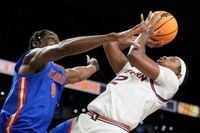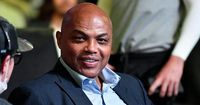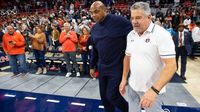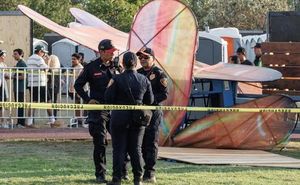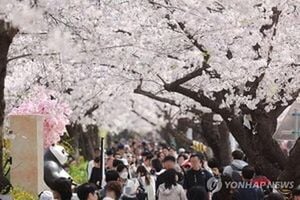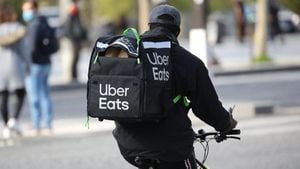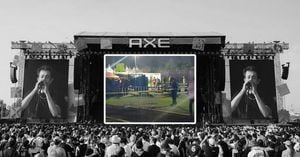Auburn leads Florida 46-38 at halftime in the Final Four in San Antonio, an effort that certainly impressed its most-famous alum. The Tigers controlled the tempo against the high-scoring Gators, who came in averaging more than 85 points per game. Florida shot 44% from the field and 40% from 3-point range, but took only 27 shots in the first 20 minutes. “I hated the first five minutes of the game; man, we don’t want to play at that pace,” Barkley said during halftime on the CBS broadcast. “I said coming in that ‘if the (score) was 70-75, Auburn’s going to win this game. If it goes above that, I think we’re going to struggle.’ But that was a perfect first half of basketball.” Auburn big man Johni Broome shook off his arm injury to score 12 points and pull down four rebounds in the first half, part of a 26-14 scoring advantage for the Tigers in the paint. Barkley — along with fellow CBS analyst Clark Kellogg — also made note of Florida’s defensive strategy against the SEC Player of the Year. “They’re not doubling Broome, so he’s going to have to dominate in the paint,” Barkley said. “We’re up a lot in the paint. Give Florida credit; that’s their game plan. They’re trying not to let our 3-point shooters get started. I do think at some point we’re going to have to make some 3s. But right now, we’re taking what they’re giving us and Johni is punishing them down low.”
On April 5, 2025, Charles Barkley was cheering on Auburn from the CBS set in their matchup against Florida in the Final Four. Barkley, a prominent Auburn basketball alumnus, has had the privilege of witnessing his team make the trip to two Final Fours, and on this occasion, he was visibly engaged with the action, providing insights and commentary as the game unfolded.
Barkley, who played for Auburn from 1981 to 1984, had previously expressed his unique choice to attend the school, humorously stating earlier this year that he chose Auburn because "they sucked." He mentioned wanting to have the opportunity to play, contrasting Auburn's program with the more established programs like Alabama and UAB. This decision proved pivotal, as he guided the Tigers to their first NCAA Tournament appearance in 1984, a significant milestone for the program.
Before Barkley's arrival, Auburn had suffered through three consecutive losing seasons. His freshman year saw the Tigers finish with a 14-14 record, where he averaged 12.7 points on 59.5% shooting, along with 9.8 rebounds, 1.8 blocks, 1.1 assists, and 0.5 steals per game. The following year, he helped the team achieve a 15-13 record, marking the program's first winning season in six years. He scored 14.4 points on 64.4% shooting, 9.5 rebounds, 1.6 blocks, 1.8 assists, and 1.1 steals per game, starting all 28 games.
In his junior season, Barkley led Auburn to a 20-win season and a No. 5 seed in the NCAA Tournament. Although the Tigers were upset in the first round by No. 12 Richmond, Barkley’s performance was outstanding, as he recorded 23 points, 17 rebounds, four assists, two steals, and two blocks. He averaged 15.1 points on 63.8% shooting, 9.5 rebounds, 1.8 blocks, 2.1 assists, and 1.1 steals per game during that season, solidifying his status as one of the program's all-time greats.
After declaring for the NBA Draft, Barkley was selected No. 5 overall by the Philadelphia 76ers, just two picks after the Chicago Bulls drafted Michael Jordan. He quickly became a standout in the league, joining a roster that included legends like Julius Erving and Moses Malone. Barkley won the NBA MVP award in 1993 and was an 11-time All-Star, also earning MVP honors in the 1991 All-Star Game. His career spanned 16 seasons, during which he played for the Philadelphia 76ers, Phoenix Suns, and Houston Rockets, and he won gold medals with Team USA in the 1992 and 1996 Olympic Games.
Barkley’s contributions to basketball were recognized with his induction into the Naismith Memorial Basketball Hall of Fame in 2006. Over his illustrious career, he earned approximately $40.6 million, showcasing not just his talent on the court but also his ability to draw fans and generate revenue for the teams he played for.
As the game continued, Auburn's strategy focused on dominating the paint, where they held a significant 26-14 scoring advantage. Johni Broome's performance was critical, especially after overcoming an arm injury to contribute effectively. His ability to score and rebound was a key factor in Auburn's lead at halftime. Barkley's insights during the CBS broadcast emphasized the importance of Auburn's tactical approach, especially in exploiting Florida's decision not to double-team Broome.
The stakes were high for both teams, as they vied for a chance to advance to the national championship game. Florida, known for their high-scoring ability, faced a tough challenge against Auburn's disciplined defense. The Tigers' ability to control the pace of the game was pivotal, as they aimed to prevent Florida from getting into their rhythm. With the first half concluded, the outcome remained uncertain, but Auburn's performance had set the tone for what could be a thrilling second half.
As the teams prepared to return to the court, fans and analysts alike were eager to see if Auburn could maintain their momentum and secure a spot in the national championship game. With Charles Barkley cheering them on from the CBS set, the Tigers had not only the support of their alumni but also a strategic advantage that could propel them forward in this critical matchup.
